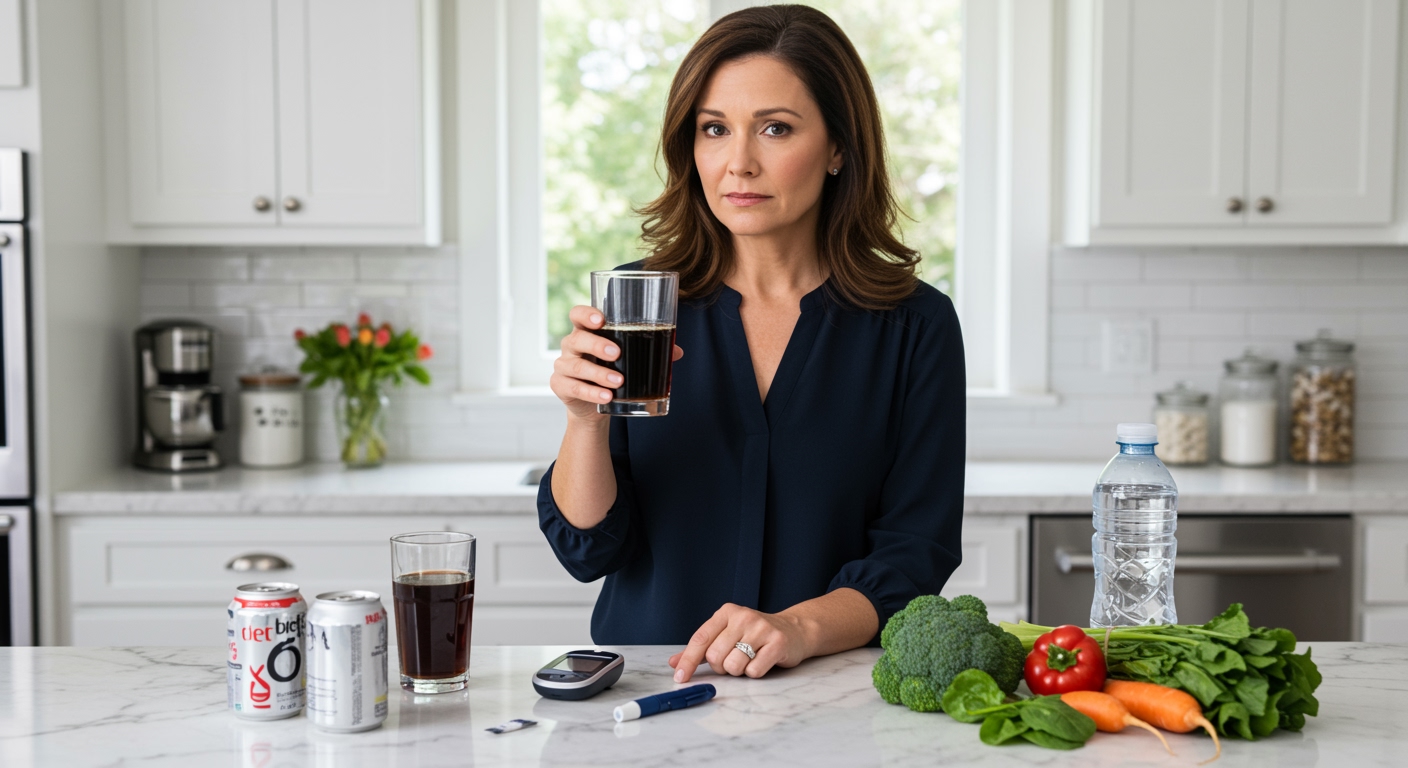✪ Key Takeaway: Diet sodas may not raise blood sugar immediately but can disrupt insulin sensitivity and glucose metabolism over time.
Introduction
You reach for that diet soda thinking you made the smart choice for your diabetes.
The zero calories and zero sugar promise seems perfect when you need to manage blood glucose levels every single day.
Hi, I’m Abdur, your nutrition coach and today I’m going to reveal the complex truth about diet sodas and diabetes that most people never learn from their doctors.
Do Diet Sodas Actually Raise Blood Sugar?
Diet sodas contain artificial sweeteners instead of regular sugar, which means they should not cause immediate blood sugar spikes.
Common artificial sweeteners like aspartame, sucralose, and acesulfame potassium pass through your digestive system without being broken down into glucose.
Your blood glucose meter will typically show no immediate increase after drinking a diet soda, unlike what happens with regular sodas.
However, some people report unexpected blood sugar changes after consuming diet drinks, which scientists believe may be related to individual gut bacteria responses to artificial sweeteners.
Research shows that artificial sweeteners can alter the composition of gut microbiota, potentially affecting how your body processes glucose from other foods consumed later.
The psychological effect also plays a role, as some people may eat more carbohydrates thinking they saved calories with their diet drink choice.
✪ Pro Tip: Test your blood sugar 2 hours after drinking diet soda to see how your body personally responds.
What Happens To Your Insulin When You Drink Diet Soda?
Your body may still produce some insulin response to artificial sweeteners even though they contain no actual sugar.
This happens because sweet taste receptors on your tongue send signals to your brain that sugar is coming, triggering a preparatory insulin release called the cephalic phase response.
When no actual glucose arrives in your bloodstream, this can create confusion in your metabolic system over time.
Studies suggest that regular consumption of artificial sweeteners may lead to insulin resistance, making it harder for your cells to respond properly to insulin.
This insulin resistance can worsen diabetes management and increase your risk of developing complications like heart disease and nerve damage.
The frequency of consumption matters significantly, with daily diet soda drinkers showing more pronounced metabolic changes than occasional users.
✪ Fact: Some artificial sweeteners are 200 times sweeter than sugar, potentially intensifying sweet cravings.
Can Diet Sodas Increase Your Diabetes Risk?
Large population studies have found surprising connections between diet soda consumption and increased risk of developing type 2 diabetes.
The Nurses Health Study followed over 40,000 women for 20 years and found that those drinking one or more diet sodas daily had a 67% higher risk of developing diabetes.
This association remains even after researchers account for body weight, physical activity, and other dietary factors that could influence diabetes development.
Scientists believe artificial sweeteners may disrupt the normal relationship between sweet taste and calorie intake, leading to metabolic confusion.
Your body learns to expect calories when it tastes sweetness, and when those calories never arrive, it may overcompensate by increasing hunger and cravings.
This can lead to overeating, weight gain, and eventually insulin resistance, all of which are major risk factors for developing type 2 diabetes.
✪ Note: Correlation does not prove causation, but the consistent findings across multiple studies are concerning.
Are There Better Drink Options For Diabetics?
Water remains the gold standard for people with diabetes, providing hydration without any impact on blood sugar or insulin levels.
Plain sparkling water with a splash of fresh lemon or lime juice gives you the fizzy satisfaction of soda without artificial additives.
Unsweetened tea and coffee offer antioxidants and may actually help improve insulin sensitivity when consumed without added sugars or artificial sweeteners.
Green tea contains compounds called catechins that research shows can help regulate blood glucose levels naturally.
If you crave something sweet, try infusing water with fresh fruits like berries or cucumber, which add natural flavor without concentrated sweeteners.
Herbal teas like cinnamon or chamomile provide variety and potential health benefits without affecting your blood sugar management goals.
✪ Pro Tip: Gradually reduce diet soda intake over 2-3 weeks to avoid triggering intense cravings for sweet drinks.
What Should You Do If You Already Drink Diet Soda Daily?
Start by tracking your blood sugar patterns for one week while maintaining your current diet soda consumption.
Then eliminate diet sodas for another week and compare your glucose readings, energy levels, and cravings during both periods.
Many people discover they feel more stable energy and fewer sugar cravings when they stop consuming artificial sweeteners regularly.
Replace your diet soda habit gradually by substituting one serving per day with water, unsweetened tea, or sparkling water with natural flavor additions.
Focus on addressing the underlying reasons you reach for diet soda, whether that is stress, boredom, habit, or the need for an energy boost.
Work with your healthcare provider to monitor how these changes affect your overall diabetes management and medication needs.
✪ Fact: It takes about 21 days to establish new drinking habits that feel natural and automatic.
The Bottom Line
Diet sodas may not immediately spike your blood sugar, but they can disrupt your metabolism and potentially worsen diabetes management over time.
Your health deserves better than artificial shortcuts that promise convenience but deliver long-term complications.
I would love to hear about your experience with diet sodas and diabetes management, so please share your thoughts or questions in the comments below.
References
At NutritionCrown, we use quality and credible sources to ensure our content is accurate and trustworthy. Below are the sources referenced in creating this article:
- Harvard Health: Artificial sugars may raise blood sugar
- Diabetes Care Journal: Diet Soda Intake and Risk of Incident Metabolic Syndrome
- PMC: Artificial sweeteners and their implications in diabetes
- Mayo Clinic: Artificial sweeteners and diabetes





